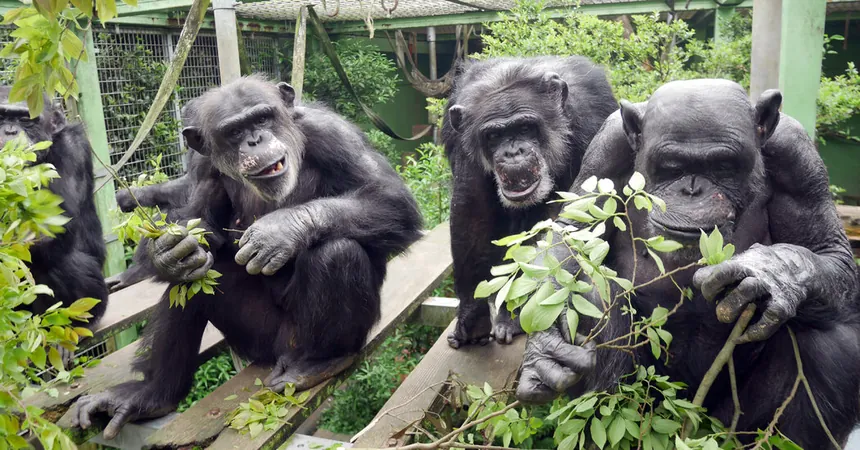
Do Chimps Who Urinate Together Really Stay Together? A Surprising Discovery in Primate Behavior!
2025-01-20
Author: Wai
Introduction
In an astonishing revelation from the world of primate research, Ena Onishi, a determined doctoral student at Kyoto University, has dedicated over 600 hours to meticulously observing chimpanzees and their curious habit of urination. What seemed like an unusual focus has unveiled a fascinating behavior that could provide profound insights into chimpanzee social dynamics.
Contagious Urination
A recent study published in the prestigious journal Current Biology introduces a phenomenon dubbed "contagious urination." This study sheds light on how these primates seem to be more inclined to urinate in unison, particularly when they observe their peers doing the same. The findings prompt intriguing inquiries into the implications of this behavior on the social lives of chimpanzees and potentially other primates.
Onishi's Research Journey
Onishi's journey into the world of contagious urination began in 2019 during her observations of a group of chimpanzees at the Kumamoto Sanctuary in Kyoto, Japan. What was initially intended as a different research project took a surprising turn as she noticed the synchrony in their urination habits. “I was fascinated and questioned if this could relate to other contagious behaviors we see in animals—like yawning,” Onishi reflected.
Monitoring Chimpanzee Behavior
To delve deeper, Onishi and her team closely monitored a troop of 20 chimpanzees, documenting over 1,300 instances of this simultaneous urination. The data was compelling: chimps urinated not only in rapid successions but those situated closer to the first urinator were much more likely to join in. Interestingly, the study revealed that lower-ranking chimps were particularly prone to urinate alongside their more dominant companions.
Implications of Findings
“This finding caught us off guard,” Onishi remarked. “It opens the door to many questions about the social importance of a behavior that hasn't received much attention until now.”
Hypotheses on Synchronization
While the definitive reasons behind this contagious behavior remain elusive, Onishi and her colleagues present several intriguing hypotheses. They suggest that such synchronization of urination may reinforce social bonds within the group and could foster a state of readiness for cooperative actions. “It’s possible that this is a subtle form of social signaling,” she explained, adding, “The implications are vast and worth considering.”
Broader Implications and Future Research
Though the study primarily involved captive chimps, many of whom were rescued from biomedical research facilities, the team believes that this behavior is likely not confined to just this population. Dr. Martin Surbeck, an evolutionary biologist at Harvard University, emphasized that similar behaviors might be observable in wild chimpanzee groups. “When you walk alongside great apes in their natural habitat, you often witness an astonishing level of coordination among group members,” Surbeck stated, echoing the notion that this may be a common trait among social animals.
Conclusion
This captivating research not only enhances our understanding of primate behavior but also encourages us to re-evaluate how social interactions manifest in the animal kingdom. So, could it be that the age-old saying holds true even among chimpanzees: those who urinate together might just stay together? This question is left tantalizingly open, inviting further exploration into the fascinating world of animal behavior.


 Brasil (PT)
Brasil (PT)
 Canada (EN)
Canada (EN)
 Chile (ES)
Chile (ES)
 Česko (CS)
Česko (CS)
 대한민국 (KO)
대한민국 (KO)
 España (ES)
España (ES)
 France (FR)
France (FR)
 Hong Kong (EN)
Hong Kong (EN)
 Italia (IT)
Italia (IT)
 日本 (JA)
日本 (JA)
 Magyarország (HU)
Magyarország (HU)
 Norge (NO)
Norge (NO)
 Polska (PL)
Polska (PL)
 Schweiz (DE)
Schweiz (DE)
 Singapore (EN)
Singapore (EN)
 Sverige (SV)
Sverige (SV)
 Suomi (FI)
Suomi (FI)
 Türkiye (TR)
Türkiye (TR)
 الإمارات العربية المتحدة (AR)
الإمارات العربية المتحدة (AR)